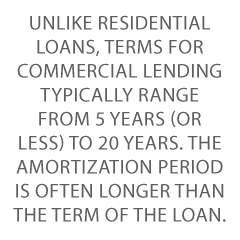If you’re in the market for commercial real estate loans for your small business, you may be wondering about their details, and how to get them. Who offers these commercial loans? What interest rate will you have to pay?
A small business owner may even be wondering if a business credit card can be used as a financing solution.
What is a Commercial Loan for Real Estate Financing?
Commercial real estate (CRE) is income-producing property with just business (rather than residential) purposes. Examples of this type of investment property include retail malls, professional offices such as for dentists, office buildings and complexes, and auto dealerships.
Financing, including the acquisition, development, and construction of these properties, often comes from commercial real estate loans. Options include a construction loan, a business line of credit, a hard money loan, and a bridge loan.
These are mortgage loans secured by liens on the commercial property. So this is a commercial loan for real estate financing.
What is a Commercial Loan for Real Estate All About?
A commercial real estate loan is often made to business entities.
These include developers, corporations, limited partnerships, and funds and trusts. These entities are often formed for the specific purpose of owning commercial real estate.
But such a business entity may not have a financial track record or any credit rating. In that case the lender may require the principals or owners of the entity to guarantee the loan.
Hence a person (or group of people) puts their property on the line. In case of loan default, the lender can recover from them.
If the lender does not require this type of guarantee, and the property is the only means of recovery in the event of loan default, this debt is a non-recourse loan. It means the lender has no recourse against anyone or anything other than the property.
What are Typical Commercial Loan Terms for Real Estate? 
Unlike residential loans, terms for commercial lending typically range from 5 years (or less) to 20 years. The amortization period is often longer than the term of the loan.
Amortization is an accounting technique. Its use is to periodically lower the book value of a loan or intangible asset over a set period of time.
A lender, for example, might make a commercial loan for a term of eight years, with an amortization period of 30 years. Here, the investor would make payments for eight years, of an amount based on the loan being paid off over 30 years.
Then one final balloon payment of the entire remaining balance on the loan follows.
The length of the loan term and the amortization period affect the rate the lender charges. Depending on the investor’s credit strength, these terms may be negotiable.
But in general, the longer the loan repayment schedule, the higher the interest rate.
What are Loan-to-Value Ratios in a Commercial Loan for Real Estate?
LTV is a calculation measuring the value of a loan against the value of the property. A lender calculates LTV by dividing the amount of the loan by the lesser of the property’s appraised value, or its purchase price. For example, the LTV for a $80,000 loan on a $100,000 property would be 80% ($80,000 ÷ $100,000 = 0.8, or 80%).
Borrowers with lower LTVs will qualify for more favorable financing rates than those with higher LTVs. This iss because they have more equity (i.e., a stake) in the property. It works out to be less risk from the lender’s perspective.
Commercial loan LTVs tend to fall into the 65% to 80% range. While some loans may be made at higher LTVs, they are less common. The specific LTV will often depend upon the loan category.
What is Debt-Service Coverage Ratio?
DSCR compares a property’s annual net operating income (NOI), to its annual mortgage debt service. This includes principal and interest rates. It measures the property’s ability to service its debt. You calculate it by dividing the NOI by the annual debt service.
For example, a property with $150,000 in NOI and $100,000 in annual mortgage debt service, would have a DSCR of 1.5 ($150,000 ÷ $100,000 = 1.5). The ratio helps lenders determine maximum loan size. That has a basis in the cash flows generated by the property.
What Does it Mean to Have a DSCR of Less than One?
A DSCR of less than 1 means a negative cash flow. For example, a DSCR of .93, means there is only enough NOI to cover 93% of annual debt service. In general, commercial lenders look for DSCRs of at least 1.25. This is to ensure adequate cash flows.
A lower DSCR may be okay for loans with shorter amortization periods, and/or properties with stable incomes. Higher ratios may be required for properties with volatile cash flows.
These include, for example, hotels. This is because hotels do not have long-term (i.e., more predictable) tenant leases, which other types of commercial real estate have.
What Sorts of Interest Rates and Fees Do You Typical Pay with Commercial Real Estate Financing?
Interest rates on commercial loans tend to be higher than on residential loans. Commercial real estate loans also often involve fees adding to the overall cost of the loan. These include appraisal, legal, loan application, loan origination, and/or survey fees.
Some costs must be paid up front before loan approval or rejection. Others apply annually. A commercial property loan may have restrictions on prepayment. The intention is to preserve the lender’s anticipated yield on a loan.
If investors settle the debt before the loan’s maturity date, chances are good they will have to pay prepayment penalties.
What are Some Types of Commercial Real Estate Loans?
You can invest in real estate with an SBA 7(a) loan, or an SBA 504 loan. Conventional bank loans are another option for CRE loans, as are hard money loans. Joint venture loans allow parties to share the risk and returns from commercial property investment, without having to formally enter into a real estate partnership.
You can get a commercial mortgage from Freddie Mac, or Fannie Mae. You can try credit unions, or even life insurance companies. Another option is HUD. You can try an online marketplace loan, AKA a soft money loan. Here, interest rates are still higher than conventional bank loans.
But they are lower than loans from hard money lenders. For the most part, online marketplaces match borrowers with shorter-term loans. These run from six months to a few years.
What Do Most Lenders Look for When Checking if You Qualify for Commercial Loans?
This depends on the lender and the type of financing. What they check can include available collateral, borrower creditworthiness, and certain financial ratios dependent on characteristics of the property.
Borrowers may have to provide several years of financial statements and income tax returns. Lenders may also want to see financial statements indicating cash flow for the property to be financed before they approve you for a commercial mortgage loan.
Can You Get an SBA Loan for Commercial Real Estate?
Absolutely! There are several SBA lending options out there. You can get an SBA 504 loan, which is suitable for commercial property loans of $350,000 and above.
Or get an SBA 7(a) loan, which can go up to $5 million. And don’t forget: SBA Express programs generally provide you with lower down payments and longer financing terms.
In general, the Small Business Administration will prefer to work with an Equal Housing Lender.
If you decide to go this route, consider commercial banking where you have business checking accounts or a savings account. They already know you, and you already know they can provide you with small business services.
You may even already have an assigned Relationship Manager if you have a checking account. They can help you with applying for this type of small business loan.
Check Out a Commercial Loan for Real Estate Financing from Credit Suite
Did you know Credit Suite offers commercial real estate financing? It ranges from $100,000 – $20,000,000. You can use this financing for refinancing a property, even if you are doing a cash-out refinance. Maximum LTV is 70%.
Loan-to-values range from 55 – 65%, depending on the purpose of the loan. Plus your clients can also get SBA loans. Renovations get loan to value of up to 60%.
Credit Suite has funding programs available including conventional property financing, money for investment properties and hard money loans, bridge loans and loans for the purchase of commercial real estate.
Get Commercial Real Estate Financing for All Types of Buildings!
Credit Suite offers financing for many different, even unique property types. Get funding for offices, industrial offices (this includes general or medical/dental), industrial facilities, light manufacturing buildings, and self-storage facilities.
With our commercial real estate financing, you can also get funding for mixed use properties, commercial condos, auto dealerships, light auto services, and day cares.
And you can even get funding for assisted living facilities, entertainment venues, multi-family properties, retail warehouses, and more.
Check Out Details on Credit Suite’s Commercial Loan for Real Estate Financing Program
Approval amounts go up to $20,000,000. Bad credit is okay. Use the real estate as collateral. You will need to provide bank statements. A commercial real estate loan is a big step, let’s take it together.
A Commercial Loan for Real Estate Financing: Takeaways
Commercial real estate financing is for buying properties used solely for commercial purposes. Loan terms tend to be shorter than with residential loans. Plus there are added fees such as an appraisal of the property.
You can get a commercial real estate loan from the SBA, HUD, conventional lenders, etc. Credit Suite offers a commercial loan for real estate financing for up to $20,000,000. Contact us today for more information.

